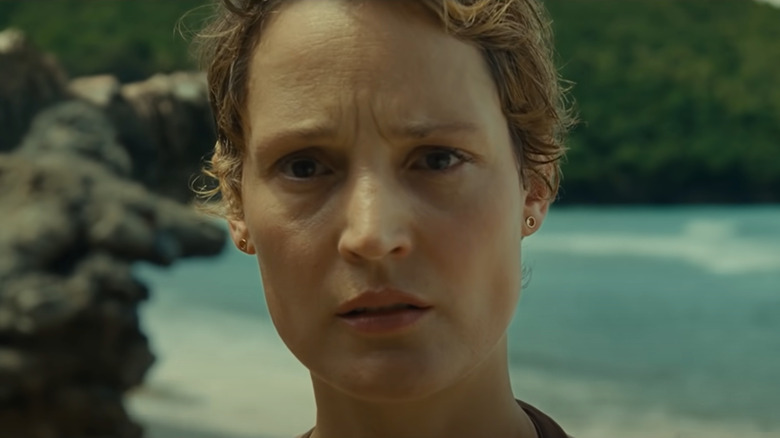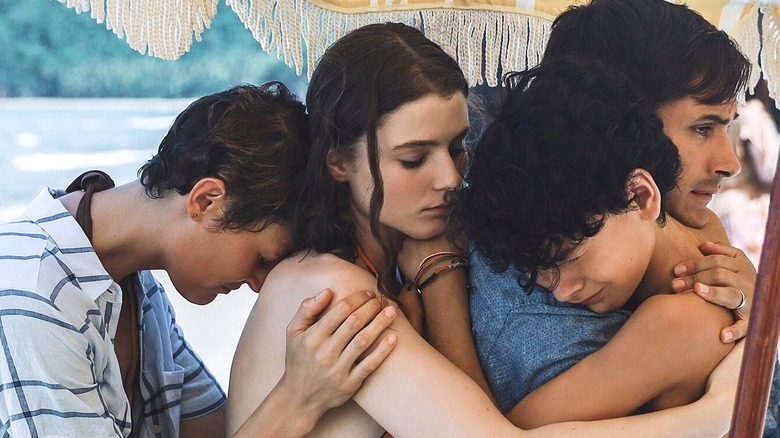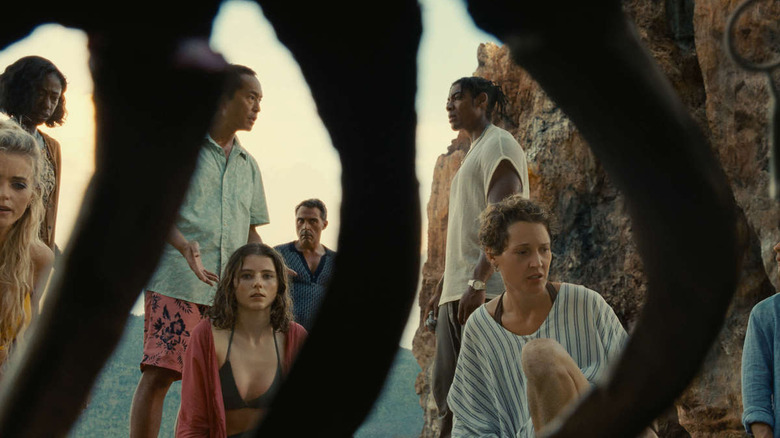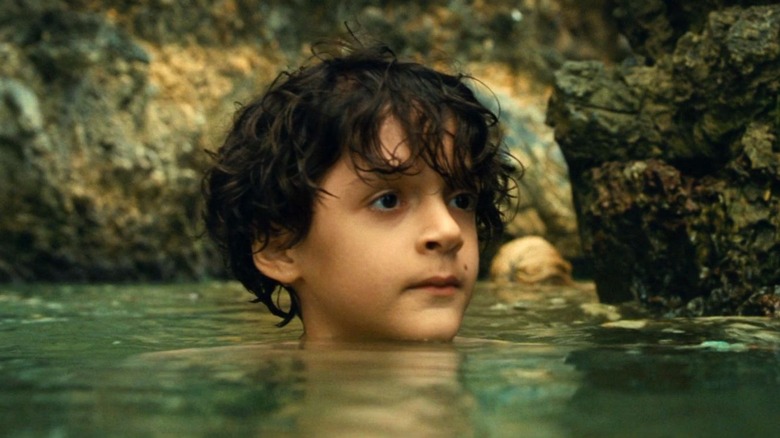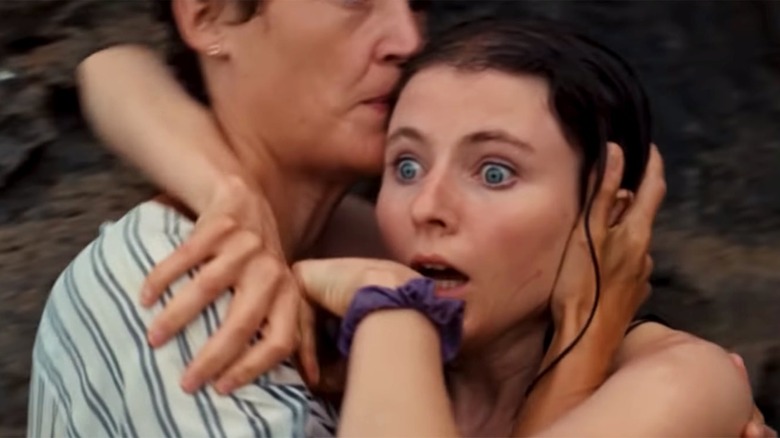Vicky Krieps Picks The Thing About Old That Creeps Her Out The Most - Exclusive Interview
In the middle of a global pandemic, M. Night Shyamalan decided his next film project would be an adaptation of the graphic novel "Sandcastle," by Pierre Oscar Levy and Frederik Peeters. The resulting film, "Old," is a story about a group of people trapped on a beach where they are all aging incredibly rapidly. It doesn't take long before death joins their little holiday, resulting in each character reacting to the sudden, early arrival of their own mortality differently.
The parallels with our own world are obvious. After all, many of us spent a year and a half largely indoors as a result of COVID-19, a novel coronavirus which has claimed millions of lives. In a way, so many of us were trapped in our own respective spaces, feeling as though death could arrive at any moment, and finding ourselves reacting in all sorts of unexpected ways.
Looper sat down with star of "The Phantom Thread" Vicky Krieps to talk about her work on "Old," what it was like working with director M. Night Shyamalan, who Krieps' character Prisca is before being trapped on that beach, and how the rapid aging process affects her. What does "Old" tell us about what we idealize, and what should we focus on instead? These are the big questions we tried to tackle while talking about the film.
Working with M. Night Shyamalan and building character
What was it like working with M. Night Shyamalan, and how did he surprise you as a director?
I knew I was going to go on an adventure. I knew I was going to go on a journey, which is new to me. I knew this is a kind of cinema I hadn't done before, and I knew it's the kind of cinema that is very much constructed. It's handmade, with little pieces that all come together, like clockwork. This is what I was kind of expecting, but then again, not having done it before, I didn't really know what to expect. He had a very good position to surprise me. I was expecting him to surprise me. What surprised me was how meticulous and how careful he is about language. Using the dialogue really like a script, and something very precious. You know what I mean? How careful he is about the words. He wrote them, but for him it's something very special, very precious.
The original graphic novel is left vague. The characters are archetypes. I'm curious what you were told about who your character was going into it. What was the background that you were given?
I remember knowing about the comic, but I also remember M. Night saying "You don't have to read it." Some of us did. I'm one of those who didn't, because I prefer to go from the script. I wasn't really told so much, but I immediately felt this connection with this character. On one hand, she's different from me. I would say I'm the girl that grew up in the forest, and is always very dreamy. She's the woman who grew up more in the city, is very controlled, and has this idea about her life, and wants to change her life. "How could I live my life better?" Then becomes so scared, of course losing this. There was something I could really relate to, and it was coming out of COVID, out of the lockdown, where I had a train of thought in terms of understanding everything is much bigger than we think. This is something that Prisca says in the movie. She understands that now things are bigger, and things move in bigger movements than she thought. We always spend our lives thinking about our little problems, and we forget we are part of something much bigger.
On getting old
How is Prisca impacted by the rapid aging? What fear does it bring out in her? How does it manifest for her?
She discovers that her biggest fear was the fear of herself, I would say. There's nothing negative coming out. The only thing she realizes is she's much stronger than she thought, that she's actually capable of saying, "Well, then that's life. This is it." She's just realizing that she was running, in her life, like we all do. Trying to optimize her life. Constantly leaving her husband, because maybe there will be something else in her life. Maybe something she hasn't experienced, whatever. Then, in this case, suddenly realizes, "Well, maybe I have everything I ever wanted." There's nothing negative coming out. What she realizes is, she was scared of herself, but didn't know how strong she was.
How were you affected by the use of old age makeup?
I was told before, it will be horrible. I was told it will be something that will make it more difficult to act. I observed the opposite. Aside that it's uncomfortable taking it off, and it takes a long time to put it on, but that's not a problem. It's just, I have to sit there. For acting, I found it more helpful, actually, and almost interesting, because what does it mean? It means I have to let go of my face. It means I have to let go of the idea I have of my face. What if I let go of my face? That's acting, so that's interesting.
On the glorification of childhood and childbirth
There are children in this movie that grow up very quickly. One of them becomes pregnant. That's anathema, I think, especially to American culture. I was curious about what your perception was of that, and how you felt about that element of the story.
Yes, totally. I would say it the way you just said it. This is how I felt when I read the script, that it was ... You said it, it was archetypes. On the other hand, it was all these glorification moments in life, which we have. Being young, having sex, and having a baby, but then also a distortion of this. It's not there for us to enjoy. It's there for us to believe that this might be nice, but then it's taken from us, immediately. The moment you think, "The baby is born," it dies. The movie, and maybe the graphic novel too, is playing with these ideas we have of a perfect life, which is, I think, why it's on the beach. I grew up in the '90s, when each ad was sending me the idea that, "One day when I'm old, I will sit on a beach, and I will be happy. I will eat a bounty, and I will use this perfume. You know, whatever. I will not be old, although I will be old." Using the beach as this kind of ad place we all grew up with, and turning it into a horror place. It's a big critique on our society.
The scariest part of Old isn't the rapid aging
What is the scariest thing for you about the story? Was it the rapid aging or something else?
I think not to rapid aging, because I tend to try and see things differently. What I have found scary was to see the ego of people come out when they're scared. How the ego can become a monster, and how the monster can go as far as even endangering, at least, other people's lives. This was a reflection that scared me a lot. Also that we all die alone. You can live each kind of life, each type of life, but you will always die alone. If you're lucky, someone will be on your side, but you do it yourself. You can only die alone, and no one will ever lift this burden off you.
What was it like acting with Night? He plays a bus driver.
Yes, exactly. Fun. He's the same person acting as he is directing. He's just a very ... Like to drive. I don't know. It's just a very ... You didn't see him do the drive, you only saw the driver. I was about to say, "Where do you see him?" He's just a very funny character, a very fun person. He always gives energy. The moment he comes on to the set, he drives the bus. You know what I mean? He is actually driving the bus, all the time. You can sit in the bus, or you can't, but he's driving the bus.
